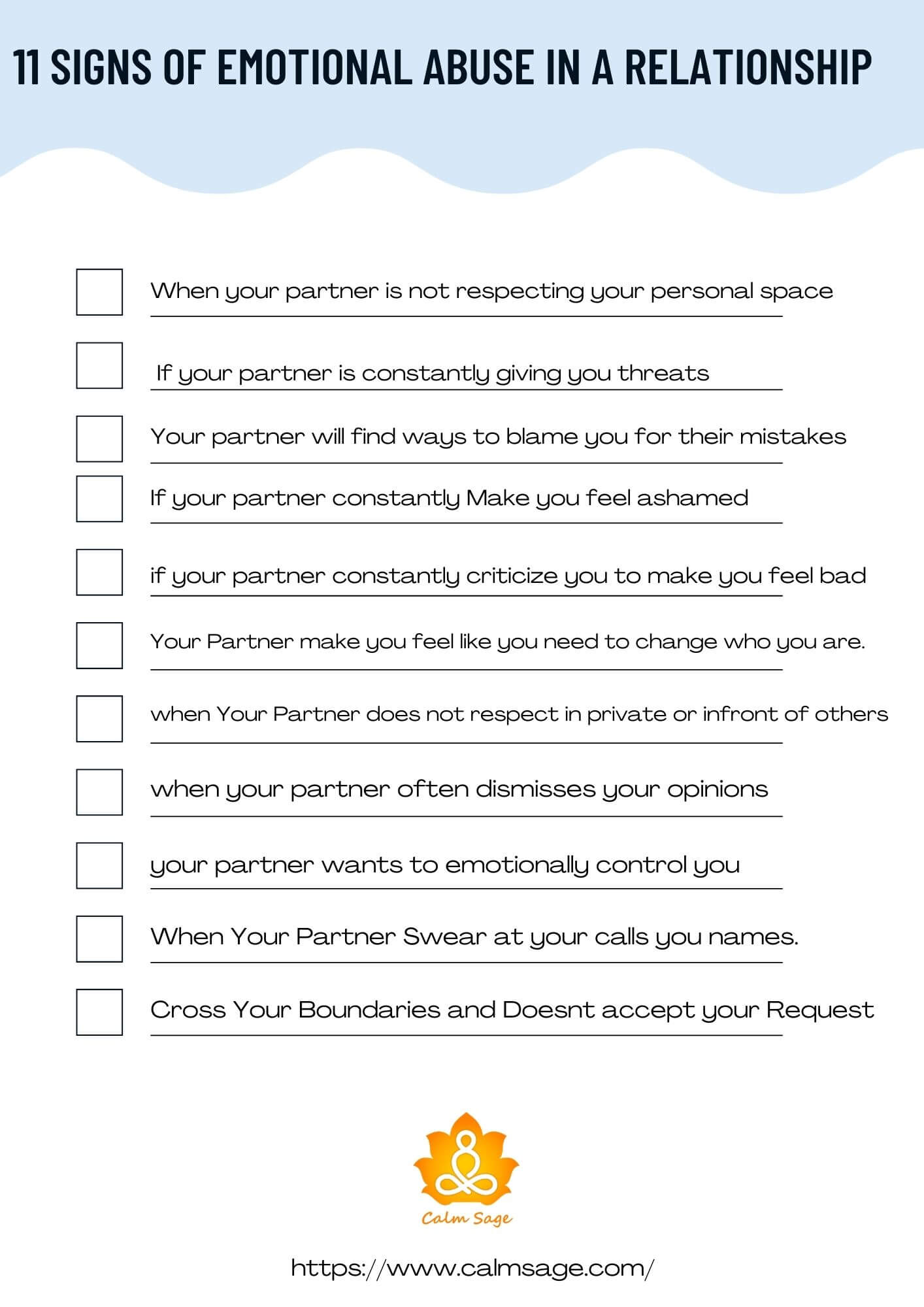Warning Signs of Emotional Abuse in Relationships! (And What to Do)

Suppose you’ve ever been in a relationship. In that case, you know what companionship, affection, and love feels like and I’m sure you also understand the feelings of jealousy, insecurities, and trust issues as well. All of us, who’ve been in a romantic relationship in our lives, have experienced all these feelings and more.
We are already aware of jealousy, criticism, and self-doubt in our relationships, but there are a handful of people who experience mental or emotional abuse in their relationships. Jealousy and criticism aside, emotional abuse in a relationship is more traumatic than you may imagine.
Emotional abuse is a type of abuse that doesn’t include physical actions. This mistreatment can come in many forms – from sweet-spoken poison to silent attacks – so it can be hard to determine emotional abuse. There would be times when you may be unable to recognize the signs and you’ll be led to believe that you’re being “too sensitive” or “it’s all normal”.
Emotional abuse in a relationship can leave you feeling isolated, lonely, helpless, and worthless. You may also find that an emotionally abusive relationship gradually takes away your power, freedom, sense of self, and your sense of personality.
It’s not always easy to spot signs of emotional abuse in a marriage or a domestic partnership, nonetheless, here are some common signs to look out for in an emotionally abusive relationship.
Signs of Emotional Abuse in a Relationship
1. Constant Monitoring
When your partner is not respecting your personal space and interferes every time you are accessing your email or social media accounts is a major sign of emotional mistreatment in a relationship. This is a manipulation tactic to keep an eye on your activities. This monitoring behavior can destroy any sense of privacy you deserve.
2. Accusing

Another sign of emotional abuse in a relationship is accusing. If your partner is constantly giving you threats and accusing you of committing things you didn’t, then it is a means of manipulating you into people-pleasing. This could also include threats of public or social humiliation so that you stop leaving your partner’s shadow in fear of being falsely accused.
3. Constant Blaming

In an emotionally abusive relationship, the blame game is played frequently. Your partner will find ways to blame you for their mistakes as often as they can. Canceled dinner plans? Your fault. Did they lose their job? Again, it’s your fault. Your abusive partner will find ways to remove or shift responsibility from themselves to you.
4. Shaming
Another sign to look out for in an emotionally abusive relationship is shaming. Shaming is any word or behavior that makes you feel ashamed. It can also make you feel like you’re wrong for thinking and behaving as you are. If your partner constantly asks you, “Why did you do that?” or “Why would you do it that way?” especially when it’s a comment on your insecurities then it could be a sign.
5. Constant Criticism
Criticism, when constructive and helpful, could benefit any one of us, but when criticism is made to make you feel bad or to shut you down in the middle of a conversation, then it could be a sign of emotional abuse in a relationship.
6. Frequent Guilt Trips
Guilt is also a major sign of emotional abuse in a marriage or a romantic relationship. It’s more often than not used as a manipulation tactic to make you feel bad about yourself, disappointed in yourself, or make you feel like you need to change who you are. When your partner makes you feel like you’ve let them down somehow, then it could be a sign of emotional abuse.
7. Demeaning
Another very common sign of emotional abuse is humiliation or demeaning behaviors directed towards you. This could be public humiliation, social embarrassment, or private demeaning actions or words that make you feel degraded or less than who you are.
8. Dismissal of Opinions
Again, if your partner often dismisses your opinions and makes you feel like you don’t hold value or are unimportant, then it’s also a sign that you’re in an emotionally abusive relationship. You deserve attention and your opinions are entitled and important as your partners’ are. So if you are often dismissed by your partner, then it’s a sign that you should not ignore it.
9. Neglecting
When your needs are not met, it could be a form of neglect. Emotional neglect can come in many ways – withholding physical affection, silent treatment, etc. In any case, these forms of neglect are all signs that your partner wants to emotionally control you and is not above using manipulation tactics to do so.
10. Verbal Attacks
Emotional abuse in a relationship isn’t always as subtle. Sometimes, it can take the form of yelling, shouting, or verbally abusing. If your partner constantly yells at you, verbally abuses you by calling you names, making jokes about your insecurities, etc. then it could be a sign of emotional abuse too.

How to Deal with an Emotionally Abusive Relationship?
Living in an emotionally abusive relationship can be challenging – for your emotions, mental health, and even physical safety. Here are some tips you can employ to deal with emotional abuse in a relationship.
I hope these tips will also help you break the emotionally abusive relationship cycle if you’re caught in one;
1. Don’t Try to “Fix” Them:
It’s normal to want to help your loved one but keep in mind that for abusive people, it’s hard to change their actions and behaviors without professional support. Instead of trying to “fix them up”, encourage them to speak to a professional.
2. Don’t Blame Yourself:
Self-blaming in emotionally abusive relationships are also common, but remember this; you do not deserve to be treated as this. No one deserves to be abused. So avoid engaging in self-blaming behaviors.
3. Focus on Your Needs:
Take care of yourself – mentally and emotionally. Taking care of yourself can help you meet your neglected needs and figure out how to move forward in the relationship including setting boundaries, seeking support, etc.
4. Don’t Engage in a Conversation with Them:
When your emotionally abusive partner keeps texting you, calling you, or emailing you, avoid engaging in a conversation with them. Try to limit your interactions with them.
5. Set Healthy Boundaries:
You need to set boundaries with your abusive partner. Set limits and express them to your partner. Let them know what kind of behavior you won’t tolerate and what they need to stop doing. Be clear and firm in your boundaries.
6. Create a Support System:
It could also work wonders for your overall health to have a support system in place. It could be challenging to open up about your abuse experiences with others but in the long run, it could be helpful for you. Try to connect with your loved ones or reach out to a therapist for help.
7. Break Off The Relationship:
If you don’t see any signs of change in your relationship, consider breaking up with your partner. State it clearly that you are ending the relationship and cutting off all ties with your abusive partner.
8. Allow Yourself to Heal:
To leave an emotionally abusive relationship fully, it’s important to allow yourself time to heal. It’s not easy to walk away from abuse so take time (as much as you need) to focus on your recovery. You can speak to a therapist or connect with a social support group for additional help and healing.

Great for a Relationship Counseling
-
$60 to $90/week, billed every 4 weeks
-
Therapy via messaging, phone, or live video chat
-
Flexible cancellation at any time
20% off your first month

Great for a large network of licensed therapists
-
$60 to $90/week, billed every 4 weeks
-
Therapy via messaging, phone, or live video chat
-
Flexible cancellation at any time
20% off your first month

Great for CBT Based therapists
-
$40/week, billed every 4 weeks
-
Therapy via messaging, phone, or live video chat
-
Specialization for CBT based Therapy
20% off your first month

Best for Treatment Plants
-
$60 to $90/week, billed every 4 weeks
-
Therapy via messaging, phone, or live video chat
-
Flexible cancellation at any time
$100 off your first month with code SPACE
Resources to Get Help with Emotional Abuse
If you’re a victim of emotional abuse in a relationship and don’t know how to reach out for help, then you can connect with one of these helpline numbers;
- National Domestic Violence Hotline at 1800-799-7233 or text “START” at 88788
- Crisis Text Line; Text “HOME” at 741741
- Safe Horizon Hotline: 1-800-621-HOPE (4673)
- Love Is Respect at 1866-331-9474
- For Immediate Emergency call 911 or your local Emergency number.
Help is available! Reach out.
Emotional abuse signs are subtle and given time, they can impact your sense of self, leaving you with nothing but a shell of your vibrant self. You need to understand that any kind of abuse on your person is not your fault, even if someone makes you believe it is.
The signs of emotional abuse are never noticeable but are there. If you can identify the signs of emotional abuse in your relationship, then it is advised that you reach out for professional support and help.
I hope this blog helped you understand the signs of an emotionally abusive relationship and how to deal with them. For more, you can reach out to us by writing to us at info@calmsage.com or DM us on our social media.
Remember, you’re not alone and help is available!
Take Care!




















